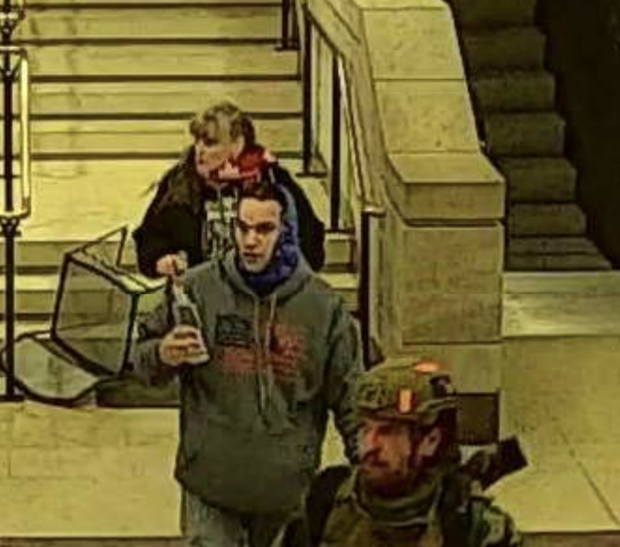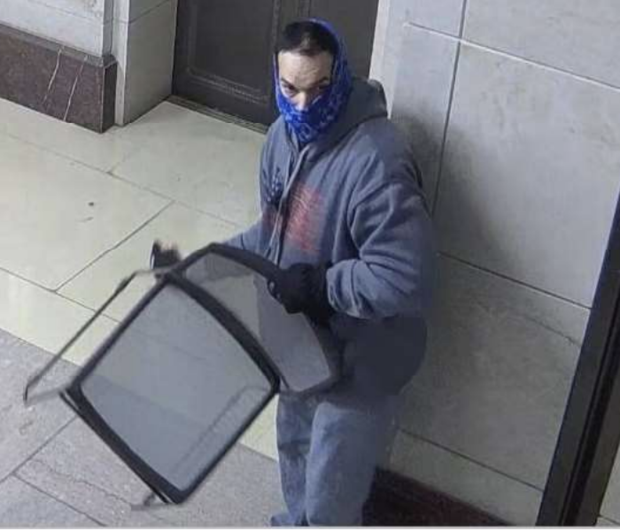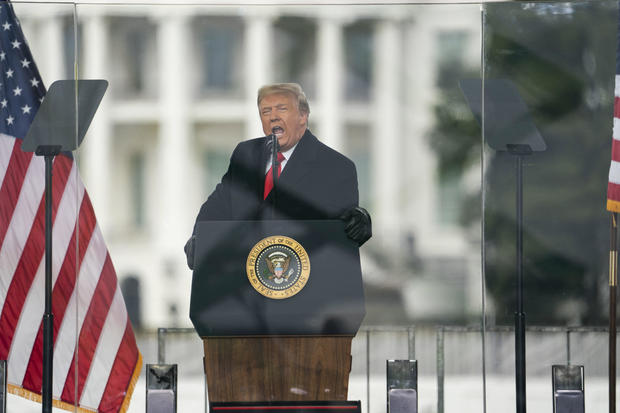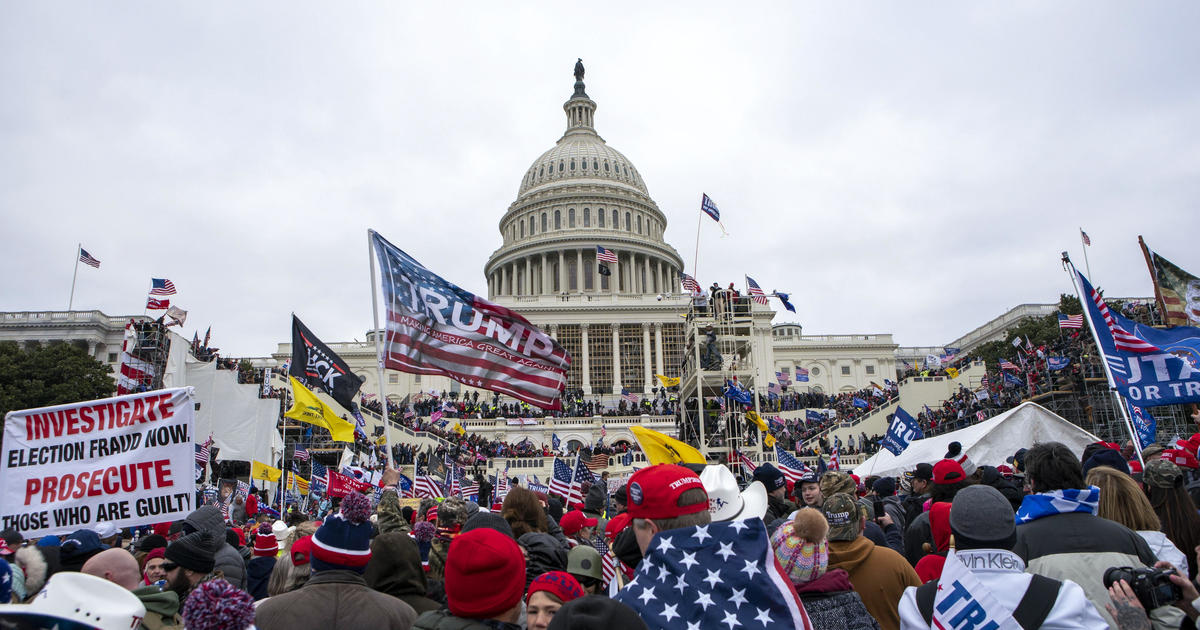/ CBS News
Judge Randolph Moss rocked slightly in his chair as he looked out over a particularly crowded courtroom last week. He then turned to face the young woman at the podium, who was clutching a piece of paper with both hands. Moss told the woman, Cassandra Buteau, that her letter to the court might have been one of the most impactful he'd ever read.
Buteau's letter sought leniency at sentencing for her parents, Jan. 6 defendants Jamie and Jennifer Buteau of Florida. The letter included the latest, and perhaps the most visceral, in a recent wave of warnings issued in courtrooms about the dangers lurking in the 2024 presidential election cycle.
A review by CBS News of court proceedings in Jan. 6th criminal cases, including the federal prosecution of former President Donald Trump, reveals a growing series of alarms being issued about the prospects of violence, conspiracy theories and election denialism during the 2024 campaign cycle.
Some of the alarms are being sounded by judges, others by prosecutors. At the Nov. 20 sentencing of Jamie and Jennifer Buteau, it was their daughter's letter that warned of the danger of "conspiracy theory rabbit holes."

Buteau's letter said her parents weren't engaged in politics until Trump came along. She said they were fed a "constant IV drip of lies, misinformation."
"The biggest lie was the election. A loss that many Trump fans could not accept, in part to do to the persistent, outrageous lies told by so many people in positions of power," Buteau wrote. "From sitting Congress members, to hosts of the highest rated cable TV channel in the country, to the very person they trusted most, the same man currently on pace to be the Republican nominee again in 2024."
As he sentenced Buteau's parents, both of whom pleaded guilty, to prison, Moss echoed the warnings about the ongoing dangers of "conspiracy theory rabbit holes." The left side of the courtroom was filled with more than a dozen family members, coworkers and friends of the Buteau family, some of whom said the Buteaus are no longer engaged or interested in politics. But Moss emphasized the broader danger ahead.
"I can't think of any event, other than the Civil War, that has driven people apart as much," Moss said, referring to the Jan. 6 assault on the U.S. Capitol.

Other federal judges have been more specific about their warnings. Hours earlier on November 20th, during arguments over the gag order issued in Trump's 2020 election conspiracy criminal case in Washington, D.C., appeals court Judge Bradley Garcia pressed Trump's attorney about connections between Trump's social media posts and the risk of harassment and threats ahead of Trump's forthcoming trial date in March next year.
"As this trial approaches, the atmosphere is going to be increasingly tense," Garcia said.
The appeals court has not yet ruled on whether to reimpose a gag order limiting Trump from making public statements targeting prosecutors, court staff or potential witnesses in his case. The Justice Department has said Trump's statements lead to harassment and threats, including one death threat against a federal judge.
The special counsel has argued Trump made a "threatening Truth Social post." The special counsel specified a post made "on August 4, the day after his arraignment in this case: 'IF YOU GO AFTER ME, I'M COMING AFTER YOU!'"
Trump's attorney has argued the former president has not made threatening statements. His attorney also argued, "The [court] had no business inserting itself into the Presidential election, just weeks before the Iowa caucuses. The First Amendment does not permit the district court to micromanage President Trump's core political speech."
Justice Department prosecutors have also emphasized the ongoing risk of political violence and a resurfacing of the instability and anger that existed in the months before Jan. 6, 2021. In a sentencing memo filed last month in the Capitol riot case of former Trump political appointee Federico Klein, prosecutors argued, "The passions that ignited the January 6 riot have not cooled since then," adding that "an upward variance would also support the need for 'adequate deterrence.'"
Months earlier, in a lengthy court filing in the seditious conspiracy case against a group of convicted Jan. 6 Oath Keepers defendants, prosecutors cited a recent poll by the University of California, Davis. The filing said, "One in five Americans believes political violence would be 'at least sometimes' justified, and one in 10 believes it would be justified if it meant the return of President Trump. Left unchecked, this impulse threatens our democracy. The defendants in this case sought to capitalize on this undercurrent in our society to change the result of a presidential election."
The judges hearing these cases have often been the most unscripted and frank in diagnosing the potential peril surrounding next year's elections. At the sentencing for a Jan. 6 defendant from Florida, Judge Tanya Chutkan said, "Every day we're hearing about reports of anti-democratic factions of people plotting violence, the potential threat of violence, in 2024." Chutkan is also the judge handling Trump's criminal case and issued the partial gag order under review by the appellate court.

"It's instructive that it's the judges who are speaking out about the prospect of violence," said Rep. Jamie Raskin, Democrat of Maryland, who investigated the Jan. 6 attack and efforts to overturn the 2020 election as part of the House Select January 6th Committee.
"All of these courts are dealing with an unceasing stream of violent threats to their personnel and to the judges," Raskin said to CBS News. "That's a strong sign of an eroding respect for the rule of law."
"There's a belief that the 'other side' isn't just a political opponent, but an evil that represents a threat to the country," said Thomas Zeitzoff, a researcher of political violence and political psychology at American University in Washington, D.C.
Zeitzoff told CBS News, "That increases the risk of political violence" during the 2024 election cycle.
The Justice Department has argued that its prosecutions of the Jan. 6 rioters helps provide deterrence from future insurrections and political violence. Federal prosecutors have opened nearly 1,200 criminal cases against accused rioters and conspirators. Nearly half of the defendants have pleaded guilty. Every Jan. 6 defendant to go to trial by jury has been partially or fully convicted of charges. None has been acquitted by jury trial.
But the recent statements by prosecutors, judges and public witnesses indicate the prosecutions have not cooled the roiling and dangerous political atmosphere and rhetoric, with less than a year until the 2024 election.
The Buteaus' daughter teared up as she read from more of her remarks in Judge Moss's court last week. She said the amplification of lies and political toxicity have an impact on "an already angry, frustrated, and yes, overly gullible group of people."
Thanks for reading CBS NEWS.
Create your free account or log in
for more features.

